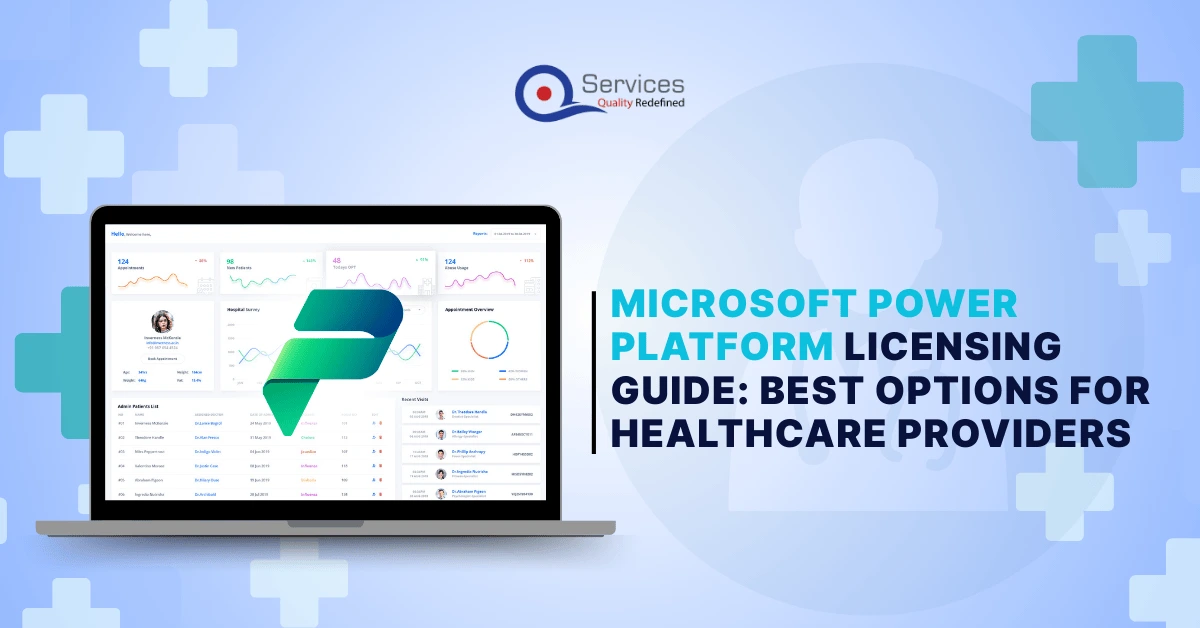
Rewards
.





CANADA
55 Village Center Place, Suite 307 Bldg 4287,
Mississauga ON L4Z 1V9, Canada
Certified Members:
.



Home » Implementing Process Automation for Streamlined Patient Care: A Step-by-Step Guide

Healthcare systems today need new ways to work faster and better, and healthcare process automation offers just that. By automating everyday tasks like billing or updating patient records, automation in the healthcare industry is helping save time and avoid mistakes. But what challenges come with this change? And how can automating healthcare processes directly improve patient care? With tools like AI and RPA leading the way, this blog explores how automation is making healthcare services quicker, simpler, and more reliable for both staff and patients.
Healthcare automation means using technology like RPA (Robotic Process Automation), AI, and Machine Learning to take over repetitive tasks. But why is it important?
Healthcare systems are slowed down by manual work that often takes up a lot of time and effort. Automation can help improve how things run, reduce mistakes, and allow healthcare workers to focus more on patient care.
For example, automated appointment scheduling systems let patients’ book, change, or cancel appointments without needing to talk to someone, which saves time. Claims processing and billing can also be automated to speed things up and make them more accurate. Plus, telehealth automation through remote patient monitoring helps keeps track of patients’ health, especially those with long-term conditions.
The numbers show why automation matters. The healthcare automation market is growing quickly. It’s expected to be worth $94 billion by 2033, with a 9.3% growth rate. The RPA market in healthcare, which was $13.86 billion in 2023, is also expected to grow to $64.47 billion by 2032.
This shows that healthcare process automation is a significant part of healthcare
So, the question arises here that, how can healthcare organizations take advantage of this automation technology to improve its efficiency? The answer lies in using automation to its fullest potential.
Let’s face it—admin tasks in healthcare can be boring and time-consuming. But benefits of automated appointment scheduling systems for patient care are hard to ignore. Patients can book appointments faster, doctors can see more patients, and there’s less back-and-forth for everyone. When it comes to managing medical records, automated medical record management takes the hassle out of it—no lost files, no manual errors. With robotic process automation in healthcare industry, these workflows become smoother, more efficient, and way less stressful.
When you team up with the right experts, the process becomes a lot easier. Choose an AI partner who knows your business inside and out. From improving customer service to streamlining workflows, business automation companies can show you the right way forward. They’ll help you integrate the best AI tools for your company.
In hospitals, time is everything. Automated diagnostic systems are not only fastened up the end results but also reduce human error. And when it comes to managing chronic illnesses, robotic process automation in healthcare is like a game player as it tracks patient data and ensures timely interventions. Whether it’s diagnostics or impact of robotic process automation on chronic disease management, RPA is making healthcare smarter and more reliable.
Benefits of automation in healthcare are real—less admin stress, more patient care.
Telehealth automation enhances remote patient monitoring, giving patients care when and where they need it.
RPA use cases in healthcare highlight how automation is improving diagnostics and chronic disease management.
With healthcare automation, patients can quickly book appointments, reducing wait times and making care more accessible. Automated appointment scheduling systems for patient care guarantee that patients can access care at the time that works best for them.
AI-driven tools like chatbots and automated reminders help patients stay on top of their health. These tools offer personalized information and make it easier to communicate with healthcare providers. As the future of AI-driven patient engagement tools in streamlining care continues to grow, patients will benefit from more personalized, real-time support that leads to better health results.
Administrative tasks take up a lot of time in healthcare. Process automation in healthcare can take care of these tasks, freeing up healthcare providers to focus on treating patients. Automation in healthcare helps make the workday less stressful and more focused on patient care.
AI helps healthcare providers diagnose illnesses quickly and accurately. By analyzing data at great speed, AI tools help doctors make better decisions about treatment. These technologies are a big part of healthcare process automation, and they ensure that patients get the right care at the right time.
Hospitals need to manage their budget in order to avoid unnecessary expenses. Process Automation in healthcare helps hospitals cut costs by improving how resources are used. It’s a key part of the healthcare automation market, where finding ways to save money and improve patient care is a constant challenge.
Automated systems make patient intake, treatment, and discharge more efficient which allows hospitals to handle more patients without sacrificing care. Healthcare process automation helps hospitals run smoothly, providing faster service and better patient care.
Get free Consultation and let us know your project idea to turn into an amazing digital product.

Personalized care with predictive analytics: AI is now helping doctors predict what might happen to a patient’s health by looking at their history and medical data. This means doctors can create more personalized treatment plans for each patient, improving patient outcomes through automation by catching issues before they become big problems.
AI chatbots and virtual assistants: You know those virtual assistants or chatbots? They’re becoming super helpful in healthcare too! They help with scheduling appointments, answering patient questions, and providing guidance—all of which make it easier for both patients and doctors to communicate and stay on top of things.
Robotic surgeries: Robots aren’t just in factories anymore—they’re in surgeries too! With robotic-assisted surgeries, doctors get a boost in precision, meaning less risk for patients and faster recovery times.
Automated diagnostic tools: Robots and AI are also getting smarter when it comes to diagnosing illnesses. With robotic process automation in healthcare industry, doctors can get faster and more accurate results, which means quicker treatment for patients.
RPA in action: Robotic process automation (RPA) is being used in all sorts of areas, from managing patient data to helping with billing, making healthcare work a lot more smoothly behind the scenes.
Telehealth automation: More people can now get care from home thanks to telehealth. Automation is helping with scheduling, patient triage, and follow-ups, making it much easier to access care, especially in areas where it’s hard to see a doctor in person.
Remote monitoring and care: Thanks to automation, doctors can now monitor patients’ health remotely—whether it’s checking their heart rate or tracking their medications. This helps catch problems early and prevents people from needing to go back to the hospital.
Appointments are so crucial in the hospital sector as doctors have a quite busy schedule, but sometimes things don’t go as planned. In that case, to fix this, one hospital used an automated system where patients could book, cancel, or reschedule their appointments online. This helped avoid mistakes like double-booking or missing appointments. With fewer errors, patients could see their doctor faster, and the staff had more time for other important tasks. Everything worked a lot better afterwards.
Dealing with chronic health issues like diabetes is quite a challenging scenario, but RPA is making it easier. One hospital used RPA tools to track how well patients were sticking to their diabetes care plans. The system collected information on its own and helped doctors notice any issues quickly. More patients followed their plans, and their health improved. RPA is showing how it can help make healthcare better!
Share your project idea with us. Together, we’ll transform your vision into an exceptional digital product!

The potential for automation in healthcare is huge, specially when it comes to improving patient care. With robotic process automation use cases in healthcare, hospitals are improving efficiency and providing patients better experiences. Whether it’s via automating scheduling or managing chronic conditions, RPA is making healthcare a way smarter and more efficient than ever.
And to get the most out of this, healthcare providers need to integrate them thoughtfully into their existing systems.
By embracing RPA and AI, healthcare organizations can not only stay competitive but also provide better care for patients.
Examples include systems that automatically schedule appointments, process claims, and monitor patients remotely for telehealth.
RPA uses software robots to handle simple tasks like entering data, scheduling appointments, and processing claims, so humans can focus on more important work.
AI can analyze huge amount of data, predict health trends, and help doctors make better decisions, improving efficiency in healthcare services.
Automated scheduling helps avoid mistakes like double bookings, reduces the number of missed appointments, and makes it easier for patients to get care.
Automation takes over routine tasks, giving healthcare workers more time to focus on patient care, which can improve their job satisfaction and productivity.
By reducing errors and speeding up processes, automation can help lower healthcare costs and make better use of resources.
Automation reduces human errors, ensures accurate data entry, and provides alerts when something’s wrong, which helps keep patients safe.
Automation in telehealth helps by making it easier to monitor patients, schedule appointments, and follow up with care, which makes remote healthcare smoother.
Machine learning can look at patient data and predict health trends, which helps doctors create more personalized treatment plans and improve diagnostic accuracy.
Automation helps by ensuring data is entered accurately, reduces duplicates, and makes patient records easy to access, which improves data management.

Microsoft Power Platform consists of several key components, including Power Automate, Power BI, Power Apps, and more. With these tools, organizations can meet the growing demands of customers and enhance operations.

The oil and gas industry must find ways to cut costs, work more efficiently, and comply with strict regulations. At the same time, companies manage remote job sites, complex supply chains, and fluctuating fuel prices. So, can technology help simplify these challenges?

Azure compliance offerings stand out in this ecosystem as a robust building block for millions of developers and IT professionals. Its comprehensive infrastructure provides the necessary tools and frameworks that enable financial institutions to address complicated security compliance challenges with ease.
Schedule a Customized Consultation. Shape Your Azure Roadmap with Expert Guidance and Strategies Tailored to Your Business Needs.
.





55 Village Center Place, Suite 307 Bldg 4287,
Mississauga ON L4Z 1V9, Canada
.




Founder and CEO

Chief Sales Officer

🎉 Thank you for your feedback! We appreciate it. 🙌